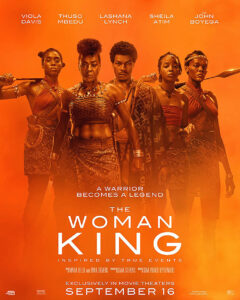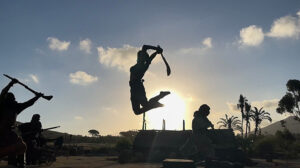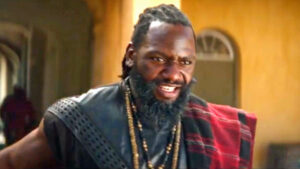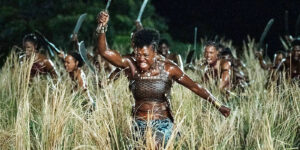 By Steve Crum
By Steve Crum
The Woman King is an immensely impressive historical action-drama film. To be honest, I was reluctant to watch it since the trailer smacked of it being nothing more than bloody battle scenes between African tribes.
The Woman King is much, much more.
Dana Stevens’ screenplay speaks to 1820s West Africa, warring tribes, slavers, power, trust, patriotism, and  love. The mix works—throughout the film’s 135 minutes.
love. The mix works—throughout the film’s 135 minutes.
Directed by Gina Prince-Bythewood (The Secret Life of Bees), filming took place in South Africa’s coastal province of KwaZulu-Natal—for jungle scenes. However, most of the movie was lensed in Cape Town.
The mostly fictional story involves the West African kingdom of Dahomey, circa 1823. General Nanisca (Viola Davis) leads an all-female troop of warriors trained to defend their territory from the  vicious Oyo Tribe. For years the Oyo have supplied Portuguese slave traders with abducted women, men and children to be chained and boated to slave auctions.
vicious Oyo Tribe. For years the Oyo have supplied Portuguese slave traders with abducted women, men and children to be chained and boated to slave auctions.
It so happens that the young women soldiers under Nanisca’s charge were rescued from Oyo’s slavers. Their incentive to fight is therefore a given. Dahomey’s King Ghezo (John Beyoga) is preparing for war with the Oyo, led by their general, Oba Ade (Jimmy Odukoya).
In the midst of impressive showings (really choreography) of Nanisca’s troops both training and doing battle, we get to know a handful of the young women prepping for combat. The primary character is the new recruit, Nawi (Thuso Mbedu), believably acted on a level equal to Davis’ general. In fact, the two are linked in complicated ways—which  directly shape the plot.
directly shape the plot.
A subplot involves Nawi’s complicated romance with Malik (Jordan Bolger), one of the slave traders.
Overall, through the truly grand finale, The Woman King is a dazzler from Terence Blanchard’s symphonic score to Polly Morgan’s eye pleasing cinematography. Acting is A-1, particularly by Davis and Mbedu.
—————
GRADE on an A-F Scale: A
